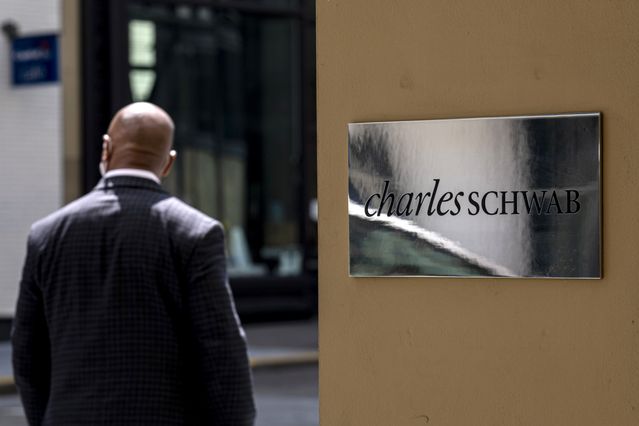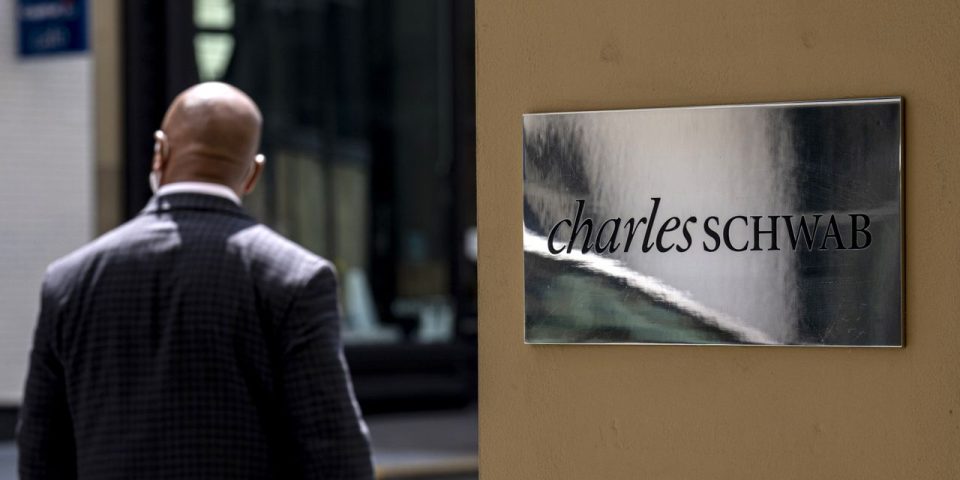Text size

David Paul Morris/Bloomberg
Stocks have soared this year. So have shares of companies that guide investors or provide platforms where they can trade. But the future isn’t uniformly bright for everyone in the game, a new Bank of America report by analyst Craig Siegenthaler argues.
Robinhood Markets (ticker: HOOD) and its splashy initial public offering may have been the talk of the market in 2021, but a new story is emerging for 2022.
Among the companies that help investors trade and manage their money, Bank of America sees the most promise in the stocks of firms that make alternative investments, such as the
Blackstone (BX). And brokers like
Charles Schwab (SCHW) and
Interactive Brokers Group (IBKR) are well-positioned to gain as Robinhood struggles.
Bank of America thinks alternative asset managers have strong growth ahead as investors look to expand their horizons beyond plain-vanilla stocks and bonds. Companies like
Ares Management (ARES), a top alternative asset manager, put money into private equity, credit, and real estate strategies that are becoming more popular.
Among alternative managers, Bank of America likes Ares, Blackstone, and
Carlyle Group (CG). They will be able to raise money easily, while also withstanding market downturns because their assets are often locked into investments for longer periods.
“Given the robust capital market backdrop, we expect strong fund raising, investing and realizations to support positive earnings revisions and stock performance into 2022 but also note that the alts are defensive (locked-up assets under management, fixed fees on committed, dry powder) if the macroeconomic backdrop deteriorates,” Siegenthaler wrote.
Other areas could be more challenged. Exchanges, for instance, look expensive. “We view overall valuations as somewhat rich relative to growth prospects which prevents us from becoming more bullish,” Siegenthaler wrote. That said, he has Buy ratings on
Nasdaq (NDAQ) and
Tradeweb Markets (TW).
Traditional asset managers could also feel pressure, because the government stimulus payments and market liquidity that boosted them during the pandemic won’t last forever.
And brokers are likely to have a mixed year, too. Companies that earn substantial net interest income from customer deposits like Schwab could be in for big gains as interest rates rise.
Siegenthaler has Buy ratings on Schwab and Interactive Brokers (IBKR), which he thinks has “the strongest organic growth prospects in our coverage through its broad offering for active traders, retail, brokers, financial advisors, hedge funds and prop traders globally.”
Robinhood, whose zero-commission model ushered in a new wave of retail stock and options trading, could be in for tougher times, Siegenthaler argues, initiating coverage with an Underperform rating and a $22 price target. After an early surge following its late-July initial public offering, Robinhood has tumbled.
The stock made its debut at $38 but has lately been trading below $20. On Thursday, it was down 7.2% to $18.09.
Robinhood’s third-quarter report was remarkably weak — the company lost customers on net after record customer growth in the first half of the year. The setup for next year looks worrisome, because “the benefits from the perfect storm created by the pandemic are now reversing at the same time its main revenue driver (PFOF—payment for order flow) is being investigated by the SEC,” Siegenthaler wrote.
He expects “the company may not turn a profit for several years.”
Robinhood declined to comment on the Bank of America report.
J.P. Morgan analyst Kenneth Worthington also sees trouble ahead for Robinhood, though he expects customer growth to improve in the fourth quarter. The biggest weight on shares now appears to be selling pressure from insiders looking to cash out, he wrote. And that pressure may not go away soon.
“Our research has indicated that selling by insiders, former convertible share owners, and pre-IPO investors has been the bigger driver of the share price declines,” he wrote. “With pre-IPO investors with still material gains, we see the potential for more selling should market conditions deteriorate and/or Robinhood fundamentals continue to not live up to expectations provided to the investment community as part of its IPO.”
Worthington rates the shares at Underweight with a $17 price target.
Write to Avi Salzman at [email protected]


